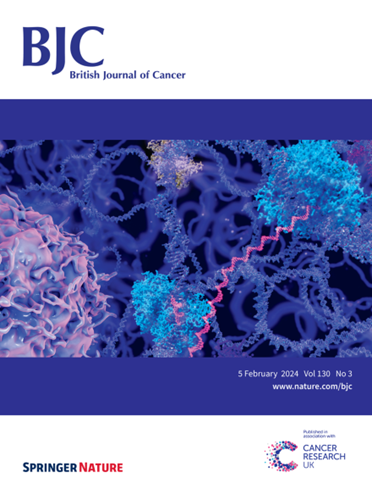ctDNA variations according to treatment intensity in first-line metastatic colorectal cancer
IF 6.4
1区 医学
Q1 ONCOLOGY
引用次数: 0
Abstract
Circulating tumor DNA variations (∆ctDNA) were reported to be associated with treatment efficacy in metastatic colorectal cancer (mCRC). The present study evaluated ∆ctDNA according to first-line treatment intensity. Patients from two prospective ctDNA collections were divided into Group ≤ 2 drugs and Group ≥ 3 drugs. ∆ctDNA were analysed from baseline to cycle 3 or 4 (C3-4) according to three predefined subgroups: ∆ctDNA ≥ 80%_ undetectable, ∆ctDNA ≥ 80%_ detectable, and ∆ctDNA < 80%. Impact of ∆ctDNA on progression-free survival (PFS) and overall survival (OS) were analysed. Pretreatment ctDNA was detected in 129/152 (84.9%) of patients. A ∆ctDNA ≥ 80%_undetectable was more frequent in Group ≥ 3 than ≤ 2 drugs (respectively 51.5% vs. 32.7%, p = 0.015). Patients with ∆ctDNA ≥ 80%_undetectable had longer survival than other ∆ctDNA subgroups, in Group ≥ 3 drugs (mPFS 11.5 vs 7.8 vs 6.3 months, p = 0.02: mOS 30.2 vs 18.1 vs 16.4 month, p = 0.04) and in Group ≤ 2 drugs (mPFS 8.4 vs 6.0 vs 5.3 months, p = 0.05; mOS 29.6 vs 14.6 vs 14.6 months, p = 0.007). Early ∆ctDNA are associated to treatment intensity in first line mCRC with a significant impact on prognosis.

一线转移性结直肠癌治疗强度对ctDNA的影响。
背景:据报道,循环肿瘤DNA变异(∆ctDNA)与转移性结直肠癌(mCRC)的治疗效果有关。本研究根据一线治疗强度评估∆ctDNA。方法:两组前瞻性ctDNA采集患者分为≤2药物组和≥3药物组。从基线到第3或第4周期(C3-4),根据三个预定义的亚组分析∆ctDNA:∆ctDNA≥80%_不可检测,∆ctDNA≥80%_可检测,∆ctDNA < 80%。分析∆ctDNA对无进展生存期(PFS)和总生存期(OS)的影响。结果:152例患者中有129例(84.9%)检测到预处理ctDNA。≥3组A∆ctDNA≥80%_undetectable发生率高于≤2组(分别为51.5% vs. 32.7%, p = 0.015)。≥3种药物组(mPFS 11.5个月vs 7.8个月vs 6.3个月,p = 0.02; mOS 30.2个月vs 18.1个月vs 16.4个月,p = 0.04)和≤2种药物组(mPFS 8.4个月vs 6.0个月vs 5.3个月,p = 0.05;mo29.6 vs 14.6 vs 14.6个月,p = 0.007)。讨论:一线mCRC早期∆ctDNA与治疗强度相关,对预后有显著影响。
本文章由计算机程序翻译,如有差异,请以英文原文为准。
求助全文
约1分钟内获得全文
求助全文
来源期刊

British Journal of Cancer
医学-肿瘤学
CiteScore
15.10
自引率
1.10%
发文量
383
审稿时长
6 months
期刊介绍:
The British Journal of Cancer is one of the most-cited general cancer journals, publishing significant advances in translational and clinical cancer research.It also publishes high-quality reviews and thought-provoking comment on all aspects of cancer prevention,diagnosis and treatment.
 求助内容:
求助内容: 应助结果提醒方式:
应助结果提醒方式:


